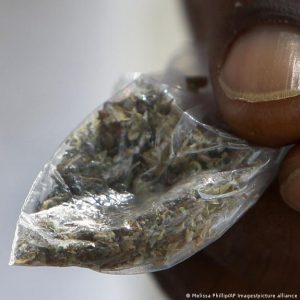Kush: The drug killing West African youth.
Sierra Leone, Guinea, and Liberia are grappling with an increasing number of young people becoming addicted to a substance known as kush or K2. Abuse of the drug has already killed several people in the region.
It’s a substance rolled up and smoked like a cigarette or cannabis. But the illegal synthetic drug known as kush is not to be mistaken with the synonymous marijuana strain. Rising cases in Sierra Leone and Guinea have shown that the drug is dangerous: After a few puffs, the consumer is left stoned, unable to stand upright.
Yet despite the aftereffects — which include falling, body injuries, and loss of self-esteem — users still search for an opportunity to obtain more.
“I’m addicted to a bad system but don’t frequently consume it,” one male kush addict in Sierra Leone’s capital, Freetown, told DW. “Instead, after a whole day, when I return home, I consume it to rest and sleep.”He admitted that some of his friends had encouraged him to try the illegal drug.
Cannabis: Open to cultural interpretation.
Opponents demonize it while supporters praise it as a universal remedy: for decades, myths and tales have surrounded cannabis like no other plant.

Mythical plant.
This is the hemp plant of legend. Intoxicating cannabis can be obtained from certain varieties, so its cultivation is strictly regulated in Germany. Unlike 200 years ago, hemp plants in the country are completely out of the public eye, paving the way for myths generated from the camps of supporters and opponents alike.
French troops brought home hashish
The use of hemp as an intoxicant has a comparatively recent history in Europe. French soldiers, who took home hashish made from the resin of female cannabis plants from Napoleon’s Egyptian campaign in 1798, played a key role in spreading it. While Napoleon banned hashish in Egypt, it became popular in Paris.
Prescribed for menstrual cramps
Since the 1990s, the UK has been discussing the legalization of cannabis. There was a rumor at the time that Queen Victoria was prescribed cannabis for menstrual cramps. The only evidence: in 1890, her personal physician John Russel Reynolds noted in a medical journal the “great value” of cannabis in treating an array of conditions.
Parchment or hemp?
Urban legend has it that the American Declaration of Independence was written on paper made from hemp. That’s not quite true: the document, vacuum-sealed and behind thick panes of glass at the National Archives in Washington, DC, was written on parchment paper. The first two drafts, on the other hand, were probably written on hemp paper.
Reefer Madness
“Reefer Madness,” originally financed by a church group under the title “Tell Your Childen,” was a 1936 US propaganda movie that depicted young people as immediately addicted, violent and crazy after consuming cannabis. With its almost comical exaggerations and misconceptions, the film is a historical testimony to the fear-mongering .
Racist undertones
Back then, Harry Anslinger, the racist head of the US Drug Enforcement Administration, had been fighting for prohibition since the 1930s. Allegedly, Mexicans and African Americans in particular consumed cannabis, but Anslinger wasn’t concerned about their health. Weed makes Black people think they’re as good as white people, he once said. For over 30 years, he set the tone of US drug policies.
Religious devotion
Other cultures are perhaps more open about the intoxicating effects of cannabis. Sacred texts about the Hindu deity Shiva state that he renounced all life’s pleasures — except cannabis. Contrary to often repeated claims, cannabis use can very well be addictive.
Kush as an alternative to cannabis
“I smoke kush. When there was no kush, I smoked diamba [marijuana],” another user who chose to remain anonymous said.
“So I feel good and even dizzy. After I smoke and feel good, I take my one energy drink. That’s it! That thing requires cold water.”
Social media in Sierra Leone is awash with photos and video clips showing young men, including security officers, caught in embarrassing situations after consuming the drug.
“This newest drug called kush is rampant in Sierra Leonean communities,” Nyamacoro Sarata Silla, a retired nurse, told DW.
“When people have taken it, they present themselves in a very strange way. For example, they can be walking in the middle of the street and suddenly fall asleep standing up.”

Many Guineans blame Sierra Leonean drug traffickers for smuggling kush into the country. Image: Shalan Stewart/ZUMAPRESS.
Deadly consequences
Another addict struggling to quit the drug said it could lead to health complications — or even death.
“I work in the medical sector. I’m advising the young ones to stop taking it. But, even [for] me, who takes it, it’s not good,” the young hospital worker told DW. He explained that he had seen a young person die after taking kush.
“He had difficulty breathing and was on an oxygen machine, but he didn’t make it. The boy was only 15 years old,” he added.
As Sierra Leone prepares for national polls this year, there are concerns that the rate at which kush consumed might lead to violence in the upcoming elections. But the Sierra Leone police say they have a proactive plan for that, according to assistant police superintendent, Brima Kamara.










Leave a Reply